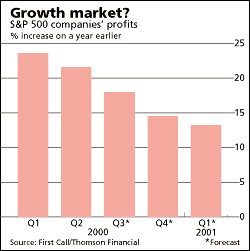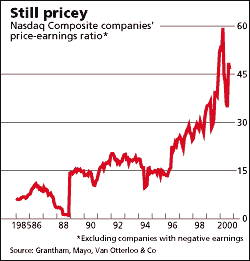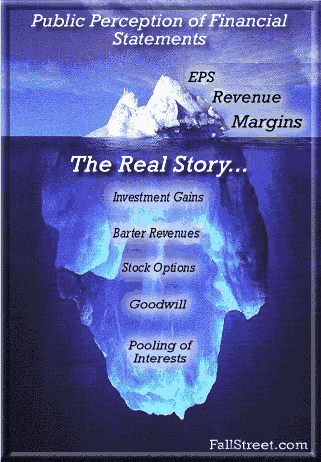 Tip of the Iceberg Tip of the Iceberg
"A soft landing for earnings in 2001 is still possible, but that the risks of something worse have gone up considerably". Chuck Hill, First Call
Since corporate earnings are anticipated to stop
declining after the second quarter of 2001, many are still confident of a 'soft landing'. However, what many are not so confident about is the quality of the earnings
being reported, and what possible effects anticipated accounting changes may have on the numbers going forward.
EPS:
The most basic headline number: Adjusted Income divided by the oustanding shares.
Revenue: Important number usually compared year-over-year.
Margins:
Another basic number: Total Revenues minus cost of goods divided by total revenue.
The Real Story
Below the tip of iceberg rests a sea of deception...
Companies have always had the ability to manipulate financial statements to boost their basic
numbers. However, as the general investing public has become more aware of some of the items helping to fuel EPS and revenue gains, skepticism has arisen. Recent shortfalls in the 'basic 3' have
caused cataclysmic stock price declines; declines marred by the fact that share prices often fall disproportionately lower than the percentage by which the estimates have been missed.
If a company is already suffering from slowing growth, a shareholder obviously has to worry about any
potential slowdown in the economy. If a company suffers a shortfall because of the weak Euro or the high price of oil, shareholders have to watch these areas for further guidance. However, when a
company misses estimates because of a slowdown in the growth of its non-core related equity investments, a shareholder has to worry about what the stock market itself will do. Consequently, the
fear of a slowing stock market has caused a great deal of pressure to build up over accounting practices.
Investment Gains:
Unlike 'investment income', investment gains are supposedly only a onetime affair -- an idea difficult to swallow when one considers that 'unrealized gains' can be banked and used at
the company's leisure. In the fourth quarter of 1999 DELL plugged in a penny of investment gains to match earnings estimates and kept another $1 Billion in 'unrealized gains' in the vault for use on a
later date. Smart thinking...
As the bull market has proliferated, investment gains have ballooned in corporations both big and
small. Should these gains or losses be included in the bottom line? Recently controversy developed surrounding Intel's second quarter earnings -- the company wanted to include 'investment gains' in
their earnings estimates and most analysts objected because the gains have nothing to do with their core business. After intense debate, phone calls and (payoffs?) the gains were included.
Intel Calls the Shots
Microsoft, Intel, Apple: What Numbers Matter?
Will companies be so willing to include these numbers in earnings estimates when and if the gains turn into loses?
Barter Revenues: Instead of the exchange of cash for goods or services, 'bartering' is the exchange
of goods/services for goods/services. In the case of many internet companies this is be done by bartering ads for ads -- the actual money the company would typically record as 'ad revenue' does not
exist but the exchange of services is recorded as revenue nonetheless. A neat trick...
The emerging Issues Task Force of the Financial Accounting Standards Board in October 1999 began to investigate the revenue accounting questions in 'internet issues'. Barter revenue was a concern
high on the list. This practice is not as rampant as it was 12 months ago. Back then, as investors became more willing to buy i-nets based on revenue numbers, 'bartering' exploded in many issues.
Investors today don't seem to care so much about revenue alone.
Stock Options:
Has the orgy of speculation in the equity markets spilled over into the reckless issuance of stock options? There is heated debate over the 'true' cost, if any, of preferred stock or
options, and this debate is unlikely to go away for many years to come. Options keep employees happy (when prices are rising) and in many cases can help a company expand its business model
significantly faster than if it had to use up cash supplies. As an example, Priceline.com had previously forged business relationships with Mr. Shatner, Delta and numerous others with preferred
stock and options - these relationships would be unattainable with cash alone. Is PCLN's business model now flawed if those options are not wanted by employees and business partners alike?
Stocks options remain a long term dilution concern -- as they are exercised the company has more
outstanding shares and the reference to these options in the footnotes will move up to infect the bottom line.
Perhaps the granddaddy of them all... 'pooling of interests' gained exposure in late 1999 when Cisco and the FASB began a series of fist-fights on the topic: the FASB wants to abolish the
practice altogether and buyout king Cisco wants no part of it.
How Cisco does it
'Pooling" can simply be explained as when a company adds the full value of the company purchased
to its books, but not necessarily the amount paid. There is growing speculation that companies will continue to rush mergers and acquisitions heading into 2001 because of the fear that this accounting
practice will be absolved.
"To escape from the fiction of goodwill charges, managers embrace the fiction of pooling. This accounting convention is
grounded in the poetic notion that when two rivers merge their streams become indistinguishable. Under this concept,a
company that has been merged into a larger enterprise has not been "purchased" (even though it will often have received a
large "sell-out" premium). Consequently, no goodwill is created, and those pesky subsequent charges to earnings are
eliminated. Instead, the accounting for the ongoing entity is handled as if the businesses had forever been one unit.".
1999 Berkshire Hathaway Annual Report Chairman's letter
Finally, Goodwill --
an intangible asset derived from the vague advantages and reputation that a corporation builds up over time (As an example, Coke has nearly $2 billion in 'Goodwill and intangibles' because it is Coke).
Amazon.com has $441 million in goodwill resting on its balance sheet, down from $534 million in
December 31, 1999: nearly $100 million in goodness has vanished into thin air...
Goodwill is a 'perceptual' number which does not directly impact corporate earnings but does impact what a company may or may not be worth. To say the least, there were not many tech companies
thrilled by the question posed by the FASB in 1999:
Why Not Eliminate Goodwill?
'Asset': This word alone peels an entirely different onion...
 As many tech giants have missed revenue and EPS targets, the evaluative landscape has switched from what a company may do in the future to what a
company is doing in the calculable present. If you understand the adage that the numbers always deceive, then it is easier to understand what will happen when specific deceptions are unable to proliferate due to
extraneous forces such as the bull/merger/labor markets. The examples listed above are accounting tricks that are not magical, but are allowed to flourish and distort the bottom line for a period of time. Surely
other areas of deception will be seen when and if these notorious examples are attended to. As many tech giants have missed revenue and EPS targets, the evaluative landscape has switched from what a company may do in the future to what a
company is doing in the calculable present. If you understand the adage that the numbers always deceive, then it is easier to understand what will happen when specific deceptions are unable to proliferate due to
extraneous forces such as the bull/merger/labor markets. The examples listed above are accounting tricks that are not magical, but are allowed to flourish and distort the bottom line for a period of time. Surely
other areas of deception will be seen when and if these notorious examples are attended to.
The most ironic point to be made is that as these
accounting practices are beginning to be challenged, earnings on the whole are just beginning to decline. Will investors continue to pay high premiums for stocks? Or is time running out...
"Do not breathe a sigh of relief if 3Q00 earnings growth for the S&P500 looks good or if the Mid-East cools down; the risks of
earnings disappointments in 4Q00 and in 2001 remain."
Chuck Hill
Misleading Accounting Exposed
Financial Accounting Standards Board
Profts? What Profits? The Economist
How companies come up with the numbers they want Business Week
|


